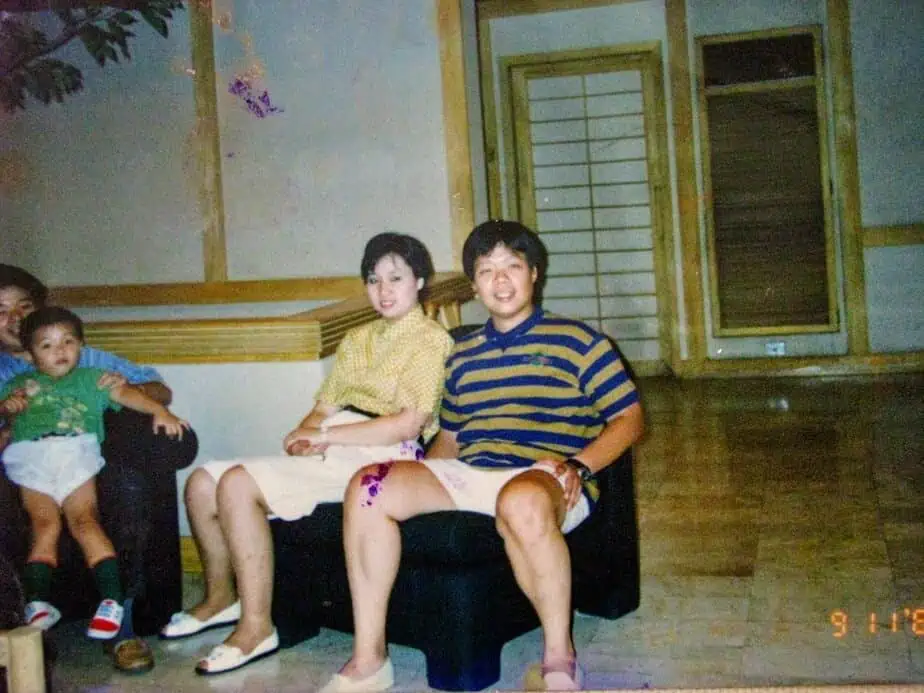Home is where we learn the most crucial life lessons. As children, we are taught by our parents about discipline and proper manners. As parents, we develop virtues such as patience, prudence, and self-control in raising our kids. Being part of a family will constantly educate us, regardless of our age.
Togetherness is one of the major lessons we will learn in a family. Although each member is unique, we all operate as one unit. Every action we take as an individual can affect the whole family. We are collectively dependent on each other. Nothing great is ever achieved without the support of a family.
I am certain each of us has our own unique lessons learned at home. But togetherness, for me, encapsulates the essence of being in a family. It is a constant reminder that whatever I have achieved as an individual is in fact a result of my parents’ sacrifices. I mean, if it was not for them, I won’t be able to go to school — or be alive even. This thought will always keep me grounded. At the same time, togetherness also makes me think twice about what I am getting myself into. Good or bad, directly or indirectly, my behavior will forever have an impact on my parents, relatives, and children.
We all learn from our families differently due to the variety of our culture, beliefs, and traditions. The purpose of this article is to contribute to the conversation and share helpful insights about family life. Read on to discover some of the most meaningful lessons I have learned from my family.

What values do you learn from your family?
Our values determine how we live our lives. In essence, the right values lead us to the right path; while the wrong values lead us to the wrong path. It is therefore essential to assess the values we receive from our families. For it will not only influence our lives but also those of our children. Below are the things I learned from my parents, from being a parent, and from simply being a part of a family.
5 things I learned from my parents
While there are many things I learned from my parents, and family life in general, here are the most meaningful thus far:
- Just keep swimming.
If I had to describe my parents in one word, it would be resilient. They have always been hard workers — not backing down on any challenges blocking their way. I have witnessed how people have disrespected them, taken advantage of them, and ridiculed them. But mom and dad simply shrugged them off and kept moving forward as a team.
- Consider others more than yourself.
My parents are among the most selfless people I know. They always think about others more than they do about themselves. Though they struggle financially, my siblings and I didn’t experience dropping out of school or having an uncomfortable childhood ever. They also regularly volunteer for church activities, and have lodged homeless people in our house several times.
- Be your own boss.
I got my entrepreneurial drive from them. My parents have been business owners as far as I can remember. This allows them to be flexible in spending time with us. They usually come home for lunch and go back to work after. Dad’s office was my favorite place to hang out when I was still a child.
- Do not be afraid to try new things.
Mom and dad constantly encourage us to explore. They support our journey to self-discovery. When I was into basketball, they enrolled me in training camps. When I was into dogs, they bought them pet accessories. When I was courting Lalaine in high school, they gave me additional allowances to take her out or buy her gifts.
- Personal relationship with God comes first.
I cannot imagine life without God. I have known Him because of my parents. Christianity will always be their greatest legacy in my life; and it is the same legacy I wish to pass on to my children. They enrolled us in a Christian school, so we could grow up in a community of Jesus followers. They have prioritized building our relationship with God more than anything else.

5 things I learned from being a parent
- Embrace the mess.
Who doesn’t want a squeaky clean house? I do. It is one of the reasons I am often in a terrible mood when we have our children. Our home has become perpetually messy. What I have cleaned for an hour will only get dirty in ten minutes — and this has driven me crazy. As a result, my relationship with my wife and the children has been strained. I eventually learned to embrace the mess — knowing this is only a phase in parenthood. It is better to have a messy house than a messy relationship. Who knows, maybe one day when the kids have grown up, I will miss the chaos in my house.
- Cherish the moments.
Every morning, when I wake up, I find myself checking my kids’ baby photos. Where has time gone? I reminisce about the moments when they were still in diapers crawling on the bed. The times when I have to bathe with them in the morning sun; and make them burp after they are fed. I have started journaling and become intentional in building moments with my family. I know there will come a day when I will want to look back at the person who they are today.
- How to express love in different ways.
I always thought love is only expressed through gifts, time, hug, words, and being nice. But along the way, I understood loving is not as easy as it sounds. Love can also be expressed in service, in discipline, in sacrifices, and by being committed. As a parent, making myself healthy is also an act of love. The better I take care of myself, the better I can also take care of my family.
- It is often better to take flight before you fight.
My default is to be reactive. When there is an issue, I want to solve it NOW. When my kids mess up, I want to punish them NOW. The problem with that approach is it rarely ends well. Typically, I either make the matter worse by messing it up more or hurting my children. One solution I found to be effective is to pause. I get out and walk around the house for ten to fifteen minutes. When I’m ready I come back and address the issue with a level head.
- Be mindful of your words, actions, and tone.
Most people already know this: Children observe and copies. I regret the time when I raised my voice at my wife because we were having a heated discussion. Because later that day, I heard our son also did the same thing to her. I was shocked and apologized to both of them. Our kids are always watching. I learned to be mindful of everything I do from that moment on. Even the movies I watch, and the music I listen to.
5 things I learned from being in a family
I generally had a close relationship with my parents and siblings growing up. As far as I can remember, we started to experience friction in our family a few years after college; and somehow grew worse when I got married. The reason, perhaps, is because I am beginning to establish my own principles, priorities, and values — which can at times contrast with theirs.
Praise God my relationship with them was restored a couple of years after a major “incident”, a.k.a. fight. The word “restore” doesn’t actually best describe it since our relationship today has never been better. We now openly share our dreams, our plans, and our struggles with each other. I also find myself missing them whenever it is time to part ways. I do not actually have the words to explain everything. All we know was Lalaine and I simply prayed, and courageously applied these values in our relationship:
- Always do the right thing because it is the right thing to do.
One of the biggest and most difficult step we ever took that fixed our relationship is moving out of my parents’ house. They initially thought we were evacuating because we resented them. But the reality is we are only following God’s call for husbands and wives to leave and cleave. It is an instruction for married couples to leave their father and mother, so they can be independent; and at the same time, be totally dependent on each other (Ephesians 5:31). Doing the right thing simply because it is the right thing to do is called integrity. If we can all behave as such in our own families, our relationships will flourish.
- You can still love one another even if you do not agree with each other.
Of course, my parents were skeptical about our decision to leave and cleave at first. Even my siblings were trying to talk us out of it. I understood where they were coming from. They want our family to stay close and have each other’s backs no matter what. But Lalaine and I have already decided to pursue the path we believe is right. Fast-forward, they eventually saw the fruits of our actions. From then on we learned to respect each other’s decisions, and embraced the differences in our opinions. Because of this, God ultimately blessed us with a richer and deeper relationship with one another.
- Whenever possible, put everything on the table.
Most seeds grow in the dark. Serious conflicts behave similarly. Confronting matters that can one day grow into something detrimental is healthy for a family. Being transparent is not an easy process, but it is a habit we must practice regularly. One of the constant issues we tackle in our family is debt. It is a painful topic for all of us to discuss because it brings back memories of failure and mistakes. Often, my dad and I get into heated exchanges with regard to this matter. But as a person who intends to free my family from this bondage, I must be brave to address it consistently. Every member should be aware of the gravity of the situation, the plan of action, and the consequences if ever we fail.
- Setup healthy boundaries.
I got this from the book Boundaries by Dr. Henry Cloud and John Townsend. It is a concept that has transformed our family relationships. Setting up boundaries, in a sense, draws a clear line between you and your family. I know, it may sound more like a division than unity among family members. But the reality is, healthy boundaries protect the harmony of the family, and its structure.
A quick example of this is priorities. We agreed not all relationships in the family are equal. To avoid unnecessary conflicts, we prioritized our relationships in this order: 1.) God 2.) Spouse 3.) Children 4.) Parents 5.) Siblings 6.) Other relatives. So let us suppose there is a conflict of schedule between my mom and my wife. Which event will I attend? Easily, I would go to my wife’s because she is a higher priority than my mom. This is, of course, in the context of a normal situation — not an emergency or a matter of life and death. By having this kind of boundary, it is easy for us to make decisions without anyone feeling offended.
- Love is not based on our emotions.
If there is only one ingredient that made us love one another consistently, it is this: love as an act of obedience to God. It is a passage from Ephesians 5:21 that we are trying to apply in our family. It is love not based on feelings or how the other person behaves. It is loving our family members no matter what, out of our reverence for Christ. Sounds cheesy? A bit. But we cannot deny the impact this instruction has made not only on our families, but on every relationship we have.

Closing thoughts
“The bond that links your true family is not one of blood, but of respect and joy in each other’s life.“
— Richard Bach
There is no perfect family. Conflicts will always be part of every household. It is a constant journey of learning how to love one another despite our disagreements. What’s nice, however, is that no matter what situation our family is in, we can always learn something valuable from each other.
See also
- What is a successful family life?
- 10 Responsibilities Of A Father I Learned In Training
- Is It Okay to Hate Parenting? (Real Talk)
- Is Being A Stay-At-Home Dad Bad? — A Wife’s Perspective
- Do This If You Want Your Kids To Treat You Well
Sources
- One flesh
“Therefore a man shall leave his father and mother and hold fast to his wife, and the two shall become one flesh.” — Ephesians 5:31
- Instructions for Christian Households.
Submit to one another out of reverence for Christ. — Ephesians 5:21
